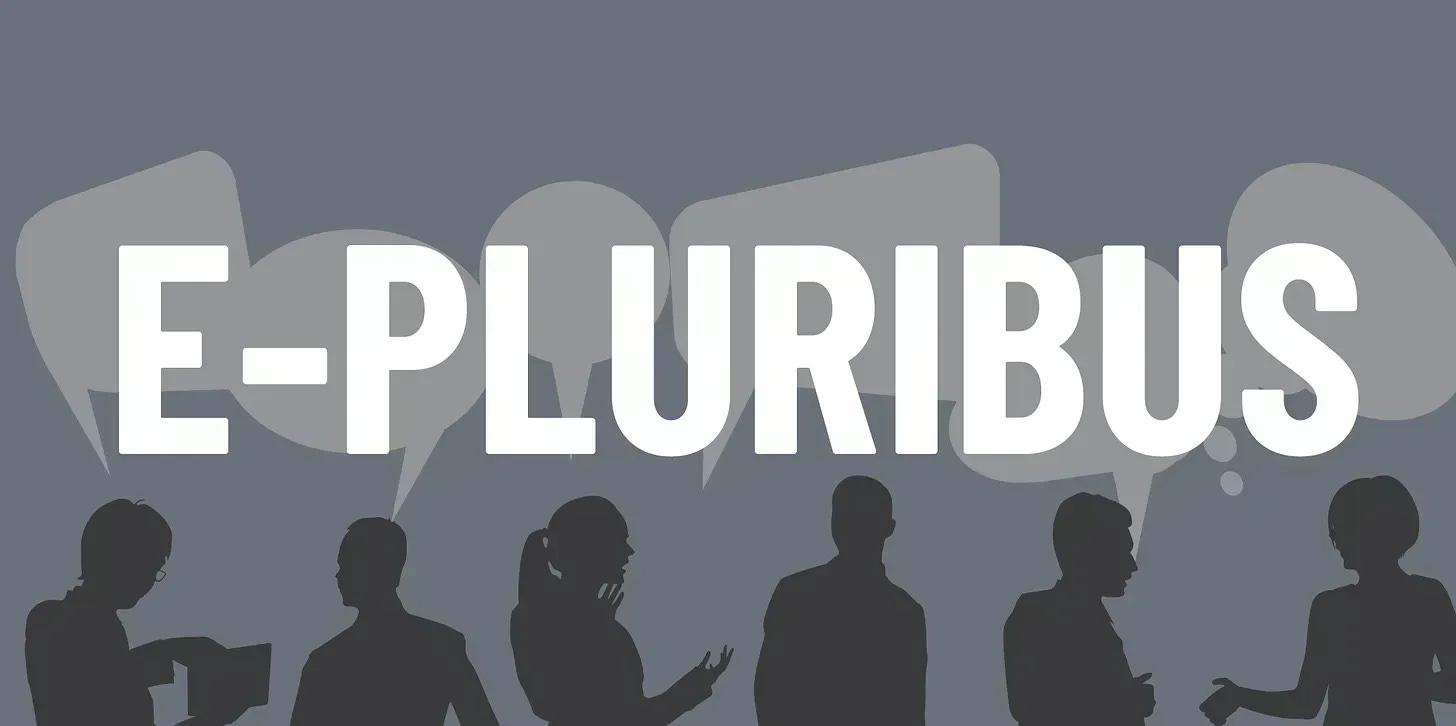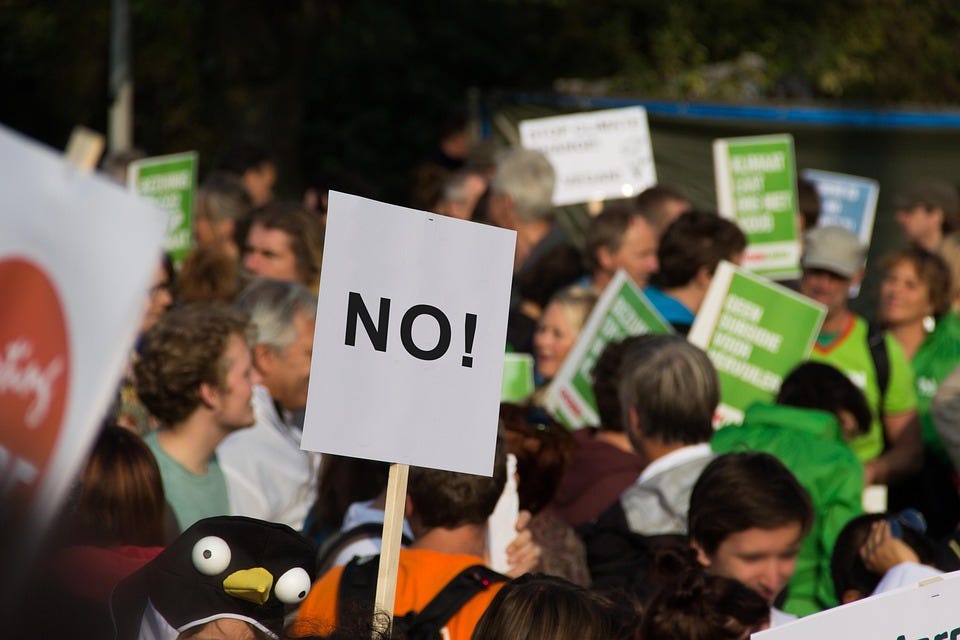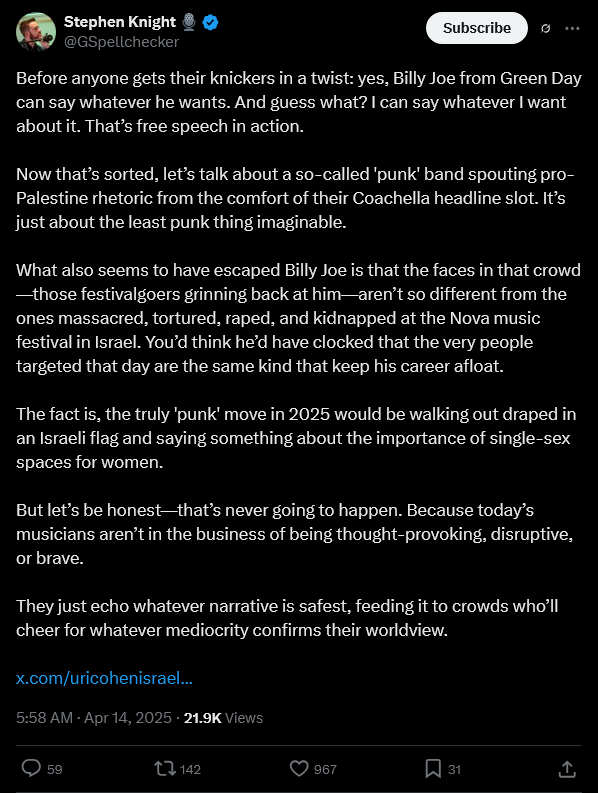E-Pluribus | April 15, 2025
The problem with 'Tesla Takedown'; First Amendment has no national security exemption; sound arguments beat expertise every time.
A round-up of the latest and best musings on the rise of illiberalism in the public discourse:
Christopher Rufo, David Reaboi: How “Tesla Takedown” Activists Fool the Public
Non-violent protest is a textbook example of free speech. The more, the better. In recent decades, though, unscrupulous activists have misused peaceful demonstrations to legitimize rioting and destruction of property—keeping just enough distance from the violence to maintain plausible deniability. Christopher Rufo and David Reaboi argue that March’s “Tesla Takedown” campaign was a troubling example of this cynical ploy in action:
Last month, a wave of more than 200 protests targeting Tesla properties erupted across the United States. The media portrayed this movement, officially branded the “Tesla Takedown,” as a spontaneous grassroots backlash against CEO Elon Musk’s role in dismantling waste and fraud in the U.S. federal bureaucracy. Each of these demonstrations appears to have been sparsely attended, but both the number of protest sites and the timeline of events suggest a coordinated effort.
On February 21, Rolling Stone published an article by activist-filmmaker Alex Winter describing the genesis of the Tesla Takedown protest campaign. Within two weeks of its publication, multiple Tesla properties were attacked with incendiary devices, and three men were arrested for separate attempts to firebomb Tesla locations in Salem, Oregon; Loveland, Colorado; and Charleston, South Carolina.
…
A closer look suggests that Tesla is the latest target of an activist and organizing ecosystem that the Left has built over decades. That infrastructure manufactures, amplifies, and strategically uses protests and “direct actions” to force concessions or policy change. These direct actions range from nonviolent (sit-ins or flash mobs) to violent (arson, harassment, or even assassination), all meant to focus attention through the drama of real-world confrontation. The goal is to bypass the normal channels of democratic decision-making, obtaining desired ends through minoritarian pressure campaigns.
It would be impossible, however, to find a single person or entity directing both the protests and the violence. Rather, the two are linked by the concept of “diversity of tactics,” an activist doctrine that holds that a movement should welcome the use of coercion methods as part of the whole range of the radicalization spectrum—from conventional, nonviolent marches to riots, property destruction, and violence—within their strategic program.
Diversity of tactics encourages activists to take advantage of a clever ruse: the public-facing flank of the movement presents the image of nonviolent resistance, while the behind-the-scenes infrastructure supports and occasionally engages in violence. One creates strategic opportunities for the other, with any connection hidden behind a veil of plausible deniability.
…
Because no single actor can be definitively tied to both the legal protests and the illegal acts of sabotage, the larger movement can present itself as both lawful and radical, pacifist and militant. The public-facing Tesla Takedown organizers don’t need to know who lit the Molotov cocktails, much less order them to do so. They merely leave room for such deeds in their strategic ecosystem, knowing that someone within their broad coalition might go ahead and commit them—and that their own efforts gain urgency, profile, and leverage as a result. The result is a seamless escalation that shields the leadership while enabling increasingly radical behavior at the margins.
This model of layered disruption has proven remarkably effective, exploiting the media’s tendency to privilege peaceful imagery and to ignore the radical infrastructure that facilitates violence. Many journalists share the protesters’ worldview and see the activists as civic-minded truth-tellers, not insurgents playing a long game of institutional destabilization. The violence, however essential, is only one feature of the larger movement, which sympathetic media describe as “mostly peaceful.”
Elizabeth Nolan Brown: Rand Paul on China, Free Speech, and Banning TikTok
Reason’s Elizabeth Nolan Brown interviews senator Rand Paul about the downsides of banning TikTok, the popular social media platform accused of collecting data on U.S. users to benefit the Chinese Communist Party. The perennial libertarian, Paul rejects national security concerns used as an excuse to suppress the free speech of American citizens:
[Nolan Brown]: What would your Repeal the TikTok Ban Act do, and why is it necessary?
[Paul]: I've been fighting against the TikTok ban since the idea came around. I think it's part of an overall hysteria on the Hill about China, and also a misguided approach. I think the more you ban trade, the more you ban things like TikTok, the worse relations get.
I think the [Supreme] Court got it wrong [when it upheld Congress' forced sale of TikTok]. I don't think there's a national security exception to the First Amendment. I think [the Court] said, "Oh, well, if Congress says there's a safety concern, we'll listen to Congress." But I don't buy that, nor do I think they proved their case.
Many of the people who voted for this, now that Trump has changed his mind, they all seem to be changing their mind, too. There actually is a possibility that something like a repeal could pass. If you're on TikTok, it's at least something to rally around to try to support.
…
[Nolan Brown]: Are you on TikTok?
[Paul]: We joined it on the last day [before the ban was supposed to take effect]. I said now that they're banning it, I want to join, just because they're telling me I can't. I am enough of a contrarian to say if you tell me I can't do something, then I want to do it.
Washington Post: No evidence linking Tufts student to antisemitism or terrorism, State Dept. office found
Tufts University student Rumeysa Ozturk was arrested in March for allegedly making public statements supporting the terrorist group Hamas. According to the Washington Post, secretary of state Marco Rubio knew before the arrest there was no evidence to justify detaining Ozturk:
Days before masked Immigration and Customs Enforcement agents detained Tufts University student Rumeysa Ozturk to deport her, the State Department determined that the Trump administration had not produced any evidence showing that she engaged in antisemitic activities or made public statements supporting a terrorist organization, as the government has alleged.
The finding, contained in a March memo that was described to The Washington Post, said Secretary of State Marco Rubio did not have sufficient grounds for revoking Ozturk’s visa under an authority empowering the top U.S. diplomat to safeguard the foreign policy interests of the United States.
The memo, written by an office within the State Department, raises doubts about the public accusations made by the Trump administration as it has sought to justify Ozturk’s deportation. The Department of Homeland Security has said Ozturk engaged in activities “in support of Hamas,” a U.S.-designated terrorist organization, but neither that agency nor U.S. prosecutors have provided evidence for that claim.
…
When asked about the memo, the State Department said “we do not comment on ongoing or pending litigation.”
DHS did not respond to a request for comment.
DHS originally recommended the revocation of Ozturk’s visa under an authority in the Immigration and Nationality Act that allows for the deportation of a foreigner if the secretary of state has reasonable grounds to believe the person’s presence or activities has “adverse policy consequence for the United States,” according to a copy of a separate memo reviewed by The Post and sent by DHS to the State Department before her detention last month.
Around X
Steven Pinker calls out a temptation many on the political right can’t resist: abandoning liberalism in their rush to oppose wokeism.
Green Day vocalist Billy Joe Armstrong stirred up controversy during the band’s weekend Coachella performance, declaring his support for the people of Palestine. Stephen Knight says the rock star has a right to speak his mind—and demonstrates that his detractors do too:
During his recent appearance on the Joe Rogan Experience, Douglas Murray chided critics of Israel who speak out despite their lack of foreign policy expertise. Eminent free-speech advocate Gad Saad says Murray’s trust-the-experts gambit is a classic trope employed by all authoritarians (video here):









